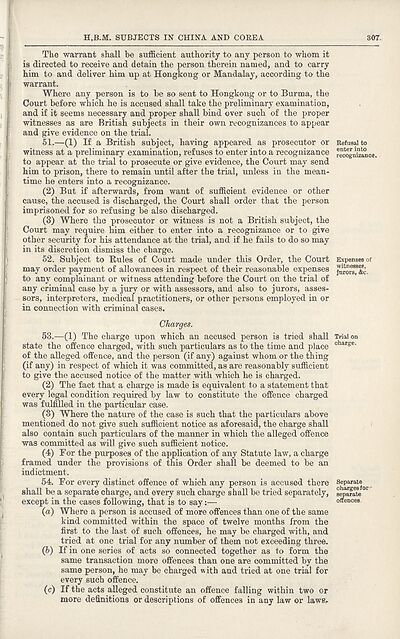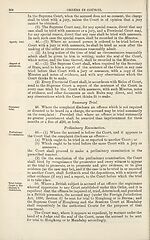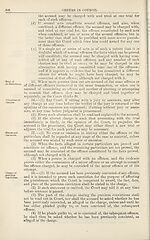1924
(363) Page 307
Download files
Complete book:
Individual page:
Thumbnail gallery: Grid view | List view

H.B.M. SUBJECTS IN CHINA AND COEEA
307.
The warrant shall be sufficient authority to any person to whom it
is directed to receive and detain the person therein named, and to carry
him to and deliver him up at Hongkong or Mandalay, according to the
warrant.
Where any person is to be so sent to Hongkong or to Burma, the
Court before which he is accused shall take the preliminary examination,
and if it seems necessary and proper shall bind over such of the proper
witnesses as are British subjects in their own recognizances to appear
and give evidence on the trial.
51. —(1) If a British subject, having appeared as prosecutor or
witness at a preliminary examination, refuses to enter into a recognizance
to appear at the trial to prosecute or give evidence, the Court may send
him to prison, there to remain until after the trial, unless in the mean¬
time he enters into a recognizance.
(2) But if afterwards, from want of sufficient evidence or other
cause, the accused is discharged, the Court shall order that the person
imprisoned for so refusing be also discharged.
(3) Where the prosecutor or witness is not a British subject, the
Court may require him either to enter into a recognizance or to give
other security for his attendance at the trial, and if he fails to do so may
in its discretion dismiss the charge.
52. Subject to Eules of Court made under this Order, the Court
may order payment of allowances in respect of their reasonable expenses
to any complainant or witness attending before the Court on the trial of
any criminal case by a jury or with assessors, and also to jurors, asses¬
sors, interpreters, medical practitioners, or other persons employed in or
in connection with criminal cases.
Charges.
53. —(1) The charge upon which an accused person is tried shall
state the offence charged, with such particulars as to the time and place
of the alleged offence, and the person (if any) against whom or the thing
(if any) in respect of which it was committed, as are reasonably sufficient
to give the accused notice of the matter with which he is charged.
(2) The fact that a charge is made is equivalent to a statement that
every legal condition required by law to constitute the offence charged
was fulfilled in the particular case.
(3) Where the nature of the case is such that the particulars above
mentioned do not give such sufficient notice as aforesaid, the charge shall
also contain such particulars of the manner in which the alleged offence
was committed as will give such sufficient notice.
(4) For the purposes of the application of any Statute law, a charge
framed under the provisions of this Order shall be deemed to be an
indictment.
54. For every distinct offence of which any person is accused there
shall be a separate charge, and every such charge shall be tried separately,
except in the cases following, that is to say:—
(a) Where a person is accused of more offences than one of the same
kind committed within the space of twelve months from the
first to the last of such offences, he may be charged with, and
tried at one trial for any number of them not exceeding three.
(h) If in one series of acts so connected together as to form the
same transaction more offences than one are committed by the
same person, he may be charged with and tried at one trial for
every such offence.
(c) If the acts alleged constitute an offence falling within two or
more definitions or descriptions of offences in any law or laws,.
Refusal to
recognizance.
Expenses of
witnesses,
jurors, &e.
Trial on
Separate
charges for-
separate
307.
The warrant shall be sufficient authority to any person to whom it
is directed to receive and detain the person therein named, and to carry
him to and deliver him up at Hongkong or Mandalay, according to the
warrant.
Where any person is to be so sent to Hongkong or to Burma, the
Court before which he is accused shall take the preliminary examination,
and if it seems necessary and proper shall bind over such of the proper
witnesses as are British subjects in their own recognizances to appear
and give evidence on the trial.
51. —(1) If a British subject, having appeared as prosecutor or
witness at a preliminary examination, refuses to enter into a recognizance
to appear at the trial to prosecute or give evidence, the Court may send
him to prison, there to remain until after the trial, unless in the mean¬
time he enters into a recognizance.
(2) But if afterwards, from want of sufficient evidence or other
cause, the accused is discharged, the Court shall order that the person
imprisoned for so refusing be also discharged.
(3) Where the prosecutor or witness is not a British subject, the
Court may require him either to enter into a recognizance or to give
other security for his attendance at the trial, and if he fails to do so may
in its discretion dismiss the charge.
52. Subject to Eules of Court made under this Order, the Court
may order payment of allowances in respect of their reasonable expenses
to any complainant or witness attending before the Court on the trial of
any criminal case by a jury or with assessors, and also to jurors, asses¬
sors, interpreters, medical practitioners, or other persons employed in or
in connection with criminal cases.
Charges.
53. —(1) The charge upon which an accused person is tried shall
state the offence charged, with such particulars as to the time and place
of the alleged offence, and the person (if any) against whom or the thing
(if any) in respect of which it was committed, as are reasonably sufficient
to give the accused notice of the matter with which he is charged.
(2) The fact that a charge is made is equivalent to a statement that
every legal condition required by law to constitute the offence charged
was fulfilled in the particular case.
(3) Where the nature of the case is such that the particulars above
mentioned do not give such sufficient notice as aforesaid, the charge shall
also contain such particulars of the manner in which the alleged offence
was committed as will give such sufficient notice.
(4) For the purposes of the application of any Statute law, a charge
framed under the provisions of this Order shall be deemed to be an
indictment.
54. For every distinct offence of which any person is accused there
shall be a separate charge, and every such charge shall be tried separately,
except in the cases following, that is to say:—
(a) Where a person is accused of more offences than one of the same
kind committed within the space of twelve months from the
first to the last of such offences, he may be charged with, and
tried at one trial for any number of them not exceeding three.
(h) If in one series of acts so connected together as to form the
same transaction more offences than one are committed by the
same person, he may be charged with and tried at one trial for
every such offence.
(c) If the acts alleged constitute an offence falling within two or
more definitions or descriptions of offences in any law or laws,.
Refusal to
recognizance.
Expenses of
witnesses,
jurors, &e.
Trial on
Separate
charges for-
separate
Set display mode to:
![]() Universal Viewer |
Universal Viewer | ![]() Mirador |
Large image | Transcription
Mirador |
Large image | Transcription
Images and transcriptions on this page, including medium image downloads, may be used under the Creative Commons Attribution 4.0 International Licence unless otherwise stated. ![]()
| Asian directories and chronicles > 1924 > (363) Page 307 |
|---|
| Permanent URL | https://digital.nls.uk/196428628 |
|---|
| Attribution and copyright: |
|
|---|---|
| Description | Volumes from the Asian 'Directory and Chronicle' series covering 1917-1941, but missing 1919 and 1923. Compiled annually from a multiplicity of local sources and research. They provide listings of each country's active corporations, foreign residents and government agencies of all nationalities for that year, together with their addresses. Content includes: various treaties; coverage of conflicts; currencies and taxes; consular fees; weights and measures; public holidays; festivals and traditions. A source of information for both Western states and communities of foreigners living in Asia. Published by Hongkong Daily Press. |
|---|---|
| Shelfmark | H3.86.1303 |
| Additional NLS resources: |

